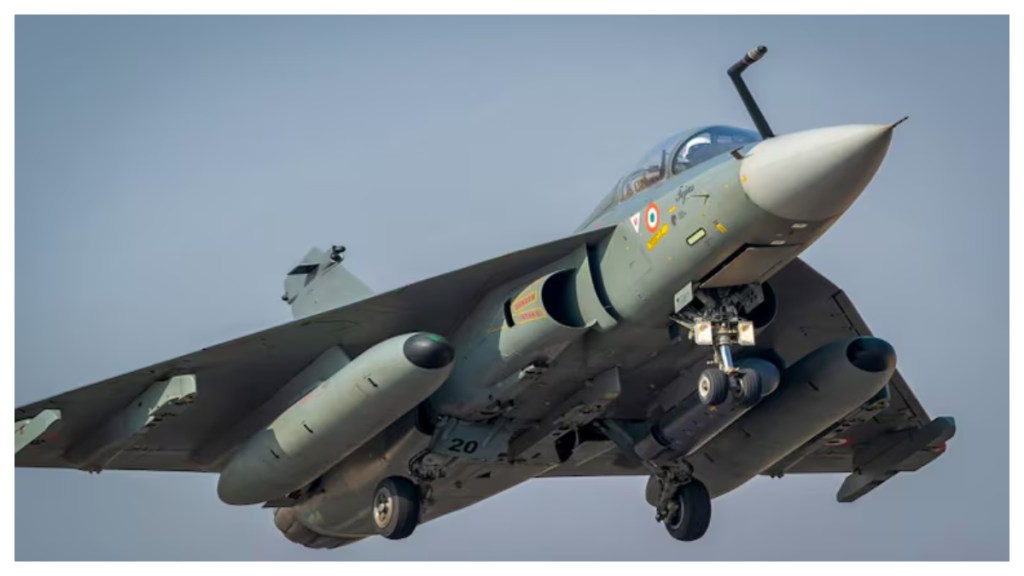By the end of the year, stage is getting set for the deliveries of the Tejas Mk-1A to the Indian Air Force from Hindustan Aeronautics Limited. According to Hindustan Aeronautics Ltd (HAL) Chairman, Dr DK Sunil, the first deliveries of the Tejas Mk-1A are set to begin by the end of 2025, following delays of about a year.
Responding to media queries related to the delay in the deliveries of the aircraft to IAF during a press conference here in Bengaluru on the sidelines of the ongoing Aero India 2025, Dr Sunil confirmed that HAL will deliver 11 Tejas Mk-1A aircraft by the end of this year, with three of these having already taken flight at the event.
The aircraft’s progress comes despite initial setbacks in engine deliveries, with a reliance on reserve engines from the previous Tejas Mk series. “The GE has stabilised its manufacturing process for the F404 engines. We have already made three aircraft, and by the end of this year, 11 will be manufactured. As the engines start coming in, our delivery to the IAF will start,” HAL CMD remarked.
“We have started building these aircraft. We had a setback in terms of engine supply, but now they have assured us that this will not happen. They will give us 12 engines this year and we will deliver. We will deliver all LCA MK-1As by 2031-32,” he said.
The Tejas Mk-1A represents a leap in India’s defence production, with significant updates from the earlier Tejas variants, including advanced avionics and weaponry. HAL’s production capabilities are now enhanced, with the company able to manufacture up to 24 aircraft per year. As Sunil explained, the current order for 83 Tejas Mk-1As will be completed in three and a half years, with a new contract for an additional 97 units expected to be finalized by the end of 2025. These orders, along with 156 Light Combat Helicopters (LCH) Prachand, represent a total value of approximately Rs 1.3 lakh crore.
The F-414 Engine Deal and Technology Transfer
A key component of the Tejas Mk-1A’s operational success lies in the F404 engines supplied by the US based General Electric (GE). However, HAL is also preparing for the future, particularly with its plans for the Tejas Mk-2 and the Advanced Medium Combat Aircraft (AMCA). In talks with GE, HAL is negotiating a technology transfer agreement that could see the American aerospace giant provide the F414 engines for the next generation of Tejas. The transfer would involve 80 percent of the technology, with GE agreeing to share detailed designs and critical manufacturing knowledge. Dr. Sunil stated, “Negotiations are on, and we are focused on acquiring the actual know-how. Only after settling the transfer of technology (ToT) issues will we proceed with cost negotiations.”
The F414 engine will provide enhanced power and efficiency, crucial for the next-generation Tejas Mk-2 and AMCA, ensuring India’s position as a competitive player in the global aerospace sector. The F414 engine deal with GE is expected to play a pivotal role in HAL’s future defence offerings. According to Dr. Sunil, discussions with GE are progressing, with a delegation from the US set to visit India later this month. The finalized agreement would provide India with the capability to manufacture the F414 engines locally, greatly enhancing self-reliance in defence production.
The Tejas Mk-2 will be a significant upgrade over its predecessor, featuring greater range, enhanced avionics, and a more powerful engine. With the AMCA, HAL is taking a leap forward in developing a fifth-generation fighter aircraft, further solidifying India’s growing aerospace capabilities.
HAL’s Expanding Order Book
The order book stands at Rs 1.2 lakh crore and the CMD noted that HAL anticipates adding another Rs 1 lakh crore in contracts in the coming year, driven by India’s expanding defence procurement. As global tensions rise, India’s defence sector is in the spotlight, with Defence Secretary Rajesh Kumar Singh unveiling plans to further accelerate defence contracts, targeting an annual procurement figure surpassing Rs 2 lakh crore in the near future.
“The demand for modern military aircraft and systems is unprecedented,” said Singh at the Defence Ministers’ Conclave during Aero India. He highlighted that new power plays, disruptive technologies, and the increased role of non-state actors are reshaping the global security landscape, making innovative defence partnerships essential.
Concerns and the ALH Helicopter Crash
Despite the optimism surrounding aircraft deliveries, there have been setbacks in the Indian defence sector. One such incident occurred on January 5, when a `Dhruv’ Advanced Light Helicopter (ALH) crashed in Porbandar, Gujarat. The tragic accident has raised concerns over the safety and reliability of the helicopter fleet, though HAL is committed to resolving these issues promptly.
Dr. Sunil addressed these concerns, saying, “A defence investigation committee has been set up to examine the cause of the ALH crash. We expect to receive findings within the next three weeks and will take further steps based on their recommendations. Until then, the fleet will remain grounded.”
The ALH, an indigenously developed helicopter, deployed in various roles ranging from search-and-rescue to anti-submarine warfare. The investigation and resolution of these safety issues are expected to restore confidence in the fleet, ensuring its continued operational success.
International Contracts and Expanding Horizons
There efforts to expand its footprint internationally. HAL is seeking international collaborations and contracts, especially in areas like engine production and aircraft manufacturing. “We are exploring multiple avenues to expand our presence in the global defence market,” Dr Sunil said.
Twin Engine Deck-Based Fighter
One of the notable projects in development is the Twin Engine Deck-Based Fighter (TEDBF), designed for the Indian Navy. A scaled model of the TEDBF was recently showcased at Aero India, drawing attention to India’s growing naval aviation capabilities. Dr. Sunil confirmed that the design for the TEDBF is complete, and the project is awaiting approval from the Cabinet Committee on Security (CCS).
